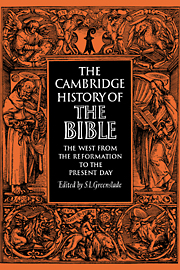Book contents
- Frontmatter
- Chapter I The Bible in the Reformation
- Chapter II Biblical Scholarship: Editions and Commentaries
- Chapter III Continental Versions to c. 1600
- Chapter IV English Versions of the Bible, 1525–1611
- Chapter V The Religion of Protestants
- Chapter VI The Bible in the Roman Catholic Church from Trent to the Present Day
- Chapter VII The Criticism and Theological Use of the Bible, 1700–1950
- Chapter VIII The Rise of Modern Biblical Scholarship and Recent Discussion of the Authority of the Bible
- Chapter IX Continental Versions from c. 1600 to the Present Day
- Chapter X English Versions since 1611
- Chapter XI The Bible and the Missionary
- Chapter XII The Printed Bible
- Chapter XIII Epilogue
- Appendices
- Bibliography
- Notes on the Plates
- Index
- Plate Section
Chapter XIII - Epilogue
Published online by Cambridge University Press: 28 March 2008
- Frontmatter
- Chapter I The Bible in the Reformation
- Chapter II Biblical Scholarship: Editions and Commentaries
- Chapter III Continental Versions to c. 1600
- Chapter IV English Versions of the Bible, 1525–1611
- Chapter V The Religion of Protestants
- Chapter VI The Bible in the Roman Catholic Church from Trent to the Present Day
- Chapter VII The Criticism and Theological Use of the Bible, 1700–1950
- Chapter VIII The Rise of Modern Biblical Scholarship and Recent Discussion of the Authority of the Bible
- Chapter IX Continental Versions from c. 1600 to the Present Day
- Chapter X English Versions since 1611
- Chapter XI The Bible and the Missionary
- Chapter XII The Printed Bible
- Chapter XIII Epilogue
- Appendices
- Bibliography
- Notes on the Plates
- Index
- Plate Section
Summary
The Circulation of the Bible
In A.D. 303 the emperor Diocletian decided to attack Christianity. Unwilling at first to have individual Christians put to death simply ‘for the name’, he devised means of sapping at the foundations of their corporate life in the Church; he forbade them to meet for worship and ordered that all church buildings should be destroyed, all church plate confiscated, and all liturgical books and copies of the Scriptures burned. Though the deacon Hermes of Heraclea might be confident that even if all copies of the Scriptures should disappear, Christians would be able to rewrite them from memory and to compose even more books to the honour of Christ, the more reflective must have been aware that the preservation of the authentic Bible text was necessary to the life and faith of the Church. Bibles were not quite like sacred vessels, which the generosity of the faithful could easily provide when peace came. Hence the moral problem of surrendering them was a difficult one, and in some parts of the Church, notably in Latin Africa, to hand over (tradere, betray) the Scriptures was regarded as an offence almost equivalent to the more obvious forms of apostasy. It is from Africa that we have a little—tantalizingly little—evidence about procedure. Magistrates were looking for corporate church property, not for private possessions. At Cirta, for example, when the Curator of the city went to the cathedral church and demanded the books, one very large codex was produced.
- Type
- Chapter
- Information
- The Cambridge History of the Bible , pp. 476 - 519Publisher: Cambridge University PressPrint publication year: 1963

